How Green Is Your Electric Car? It Depends Where You Live
Electric cars are undoubtedly greener than traditional combustion engines
but depending on where you live there can be some hidden environmental
impacts you should be aware of.
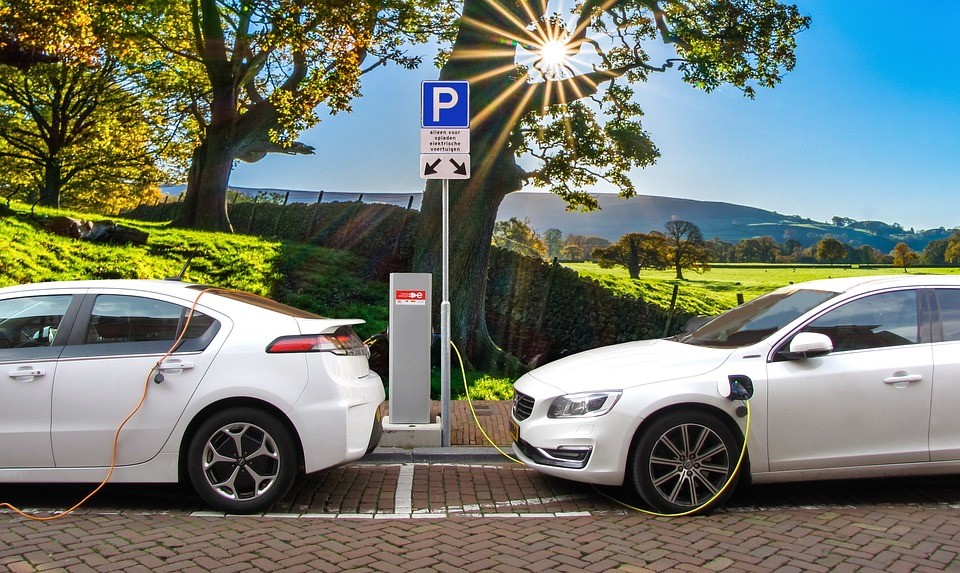
(Image via
Pixabay)
But the days of the combustion engine
are ending. We’re
witnessing the advance of electric vehicles and that has an impact on
everything from politics to mining and metals to heavily traded
Tesla shares.
As governments around the world begin
to legislate combustion engine cars out of existence, it is a good moment to
reflect on how green your electric car really is. There are obvious factors
like battery life,
construction costs, and
power usage — which vary from model to model. But by far the biggest impact
on your carbon footprint with an electric vehicle is the way that your
energy is generated.
What Is the Environmental
Impact of an Electric Vehicle?
There are a number of factors that
determine what kind of environmental impact your electric car will have.
Many, particularly the environmental impact of battery construction and
disposal, are difficult to quantify at this time.
Over the next 20 years, electric
vehicles are expected to generate
11 million tonnes of
additional battery waste per year. This could have a catastrophic impact on
the environment and will require us to rethink the way our economy
functions. This will most likely mean setting up a circular economy where
reusability is emphasized over profit. It is also likely that by the time we
reach 2030, battery technology will have improved significantly, which will
help mitigate this problem.
A wider issue, largely outside of the
control of electric vehicle consumers, is Lithium mining. This problem isn’t
unique to electric vehicles. General demand for battery powered devices has
sparked a
boom in Lithium mining.
This causes significant local environmental problems, including loss of
water or poisoned
water supplies. The
Lithium Ion problem will be difficult to solve until we develop better
battery systems that can use less damaging resources.
The final problem is the energy grid
itself. No matter where you live, electric vehicles will reduce
local emissions. But if your city or state relies heavily on fossil
fuel energy generation, are you just moving the problem elsewhere?
Do Electric Cars Just
Relocate Emissions?
The effects of air pollution created by
cars on our health is well documented. The WHO estimates that air pollution
accounts for around
4.2 million avoidable
deaths per year. Removing combustion engine vehicles from the roads of towns
and cities could help reduce local air pollution significantly.
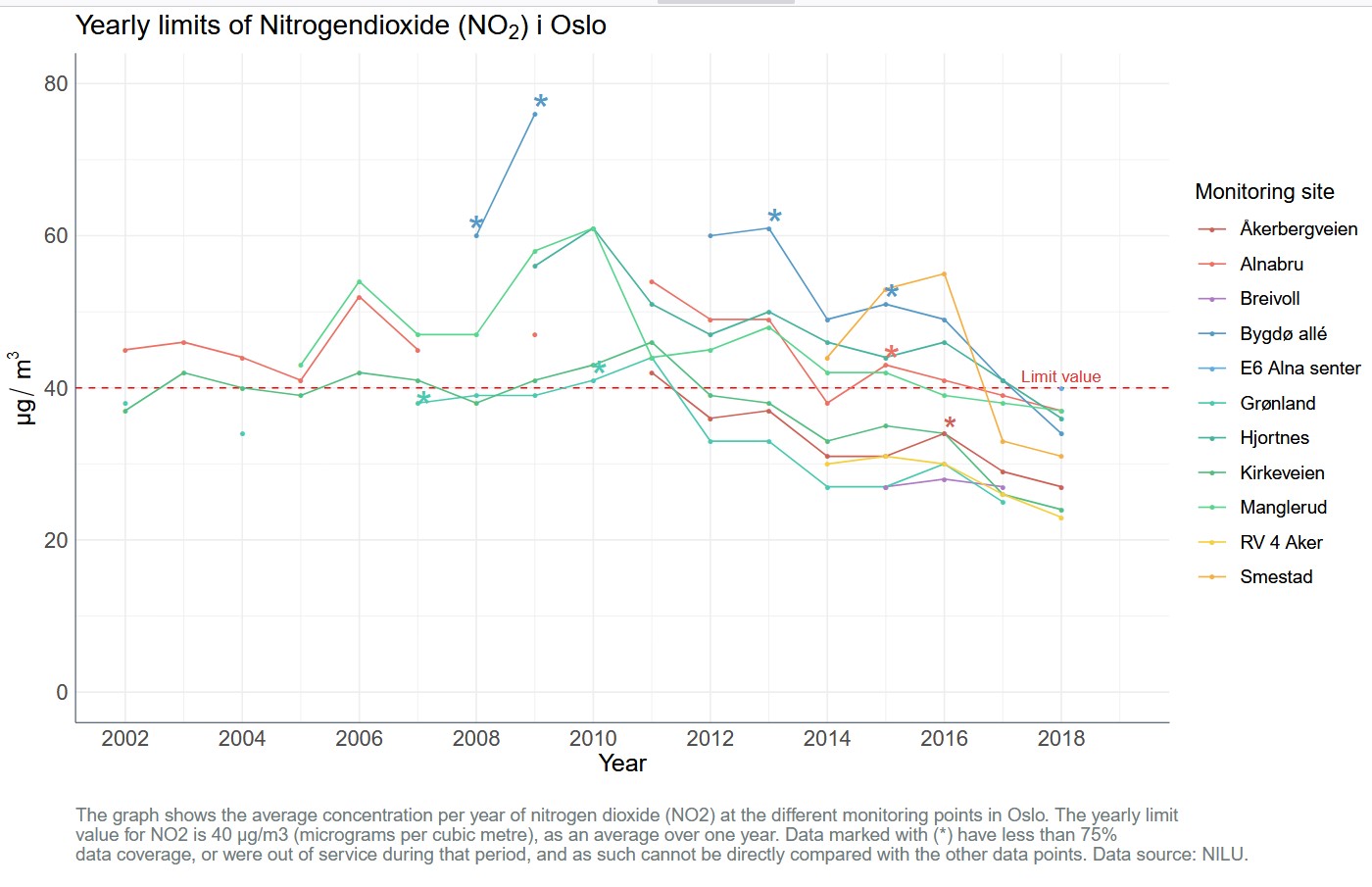
(Source)
Cities
like Oslo have
experimented with reducing car traffic in their city centers. As the above
graph shows, it saw significant improvements in air quality. By eliminating
combustion engine vehicles entirely and replacing them with electric
vehicles, it will theoretically be possible to reduce air pollution in
American cities like Los Angeles without significant investment in retooling
local car-centric infrastructure.
The problems begin if you live in an
area that relies on fossil fuels in order to generate energy. These power
plants release dangerous emissions of their own that not only cause
significant local pollution, outsourcing car emissions elsewhere, but
continue to impact climate change. This is a particularly big problem if you
look at nations with heavy coal use.
Coal Production Is the
Biggest Challenge
Coal remains are by far and away the
most polluting form of fossil fuel. The
top three coal producers
in the world are China, India, and the United States. And there are many
other surprising countries, such as Germany, that continue to rely on coal
for at least part of their energy production needs. Coal fired electricity
alone accounts for
around 30% of all carbon
released into the atmosphere on an annual basis.
This means that if you live in a very
coal-dependent economy, there is a chance (albeit a very slim one) that you
may do more harm than good by using an electric vehicle. If you live in
certain US states, most notably Wyoming or West Virginia, then you could
also be doing more harm than good.
By contrast, many other states rely
upon more environmentally friendly methods of energy production, such as
renewables, nuclear power, or even natural gas.
Which US States Produce the
Cleanest Energy?
Setting aside the rest of the world,
let’s take a moment to look at the United States. As a whole, the country
has been steadily working on decreasing carbon emissions over the course of
the 2000s. On the surface, this bodes well for energy production, but the
picture becomes less clear-cut when observing individual states.
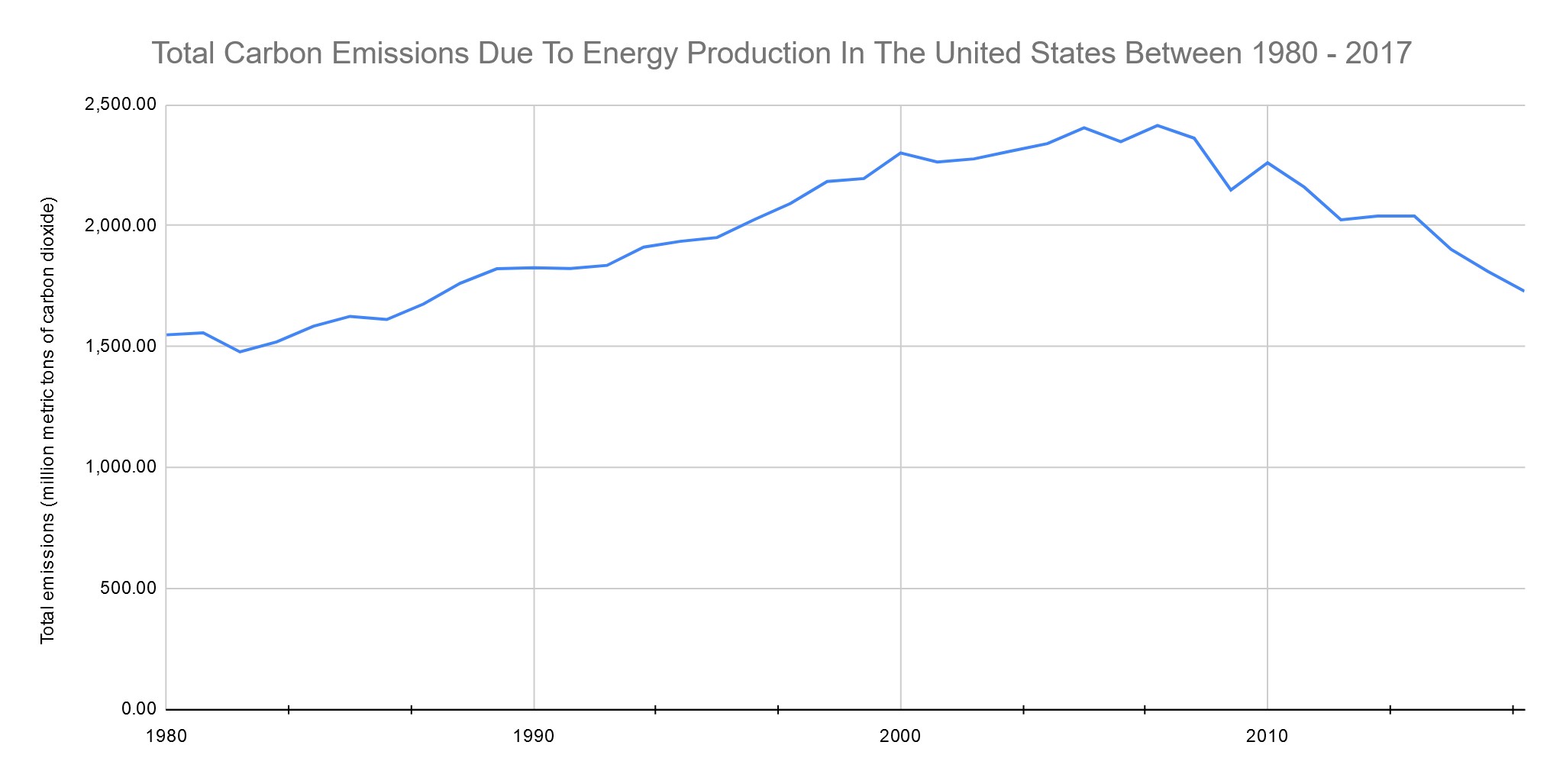
(Source:
data from US energy data information administration)
Certain states have significantly worse
emission problems. In a few specific states, transportation related
emissions are higher than even energy related emissions. The following chart
plots transportation related emissions against total energy consumption and
coal emissions. This should help us understand the specific impact if a
State were to completely move to electric vehicles overnight.
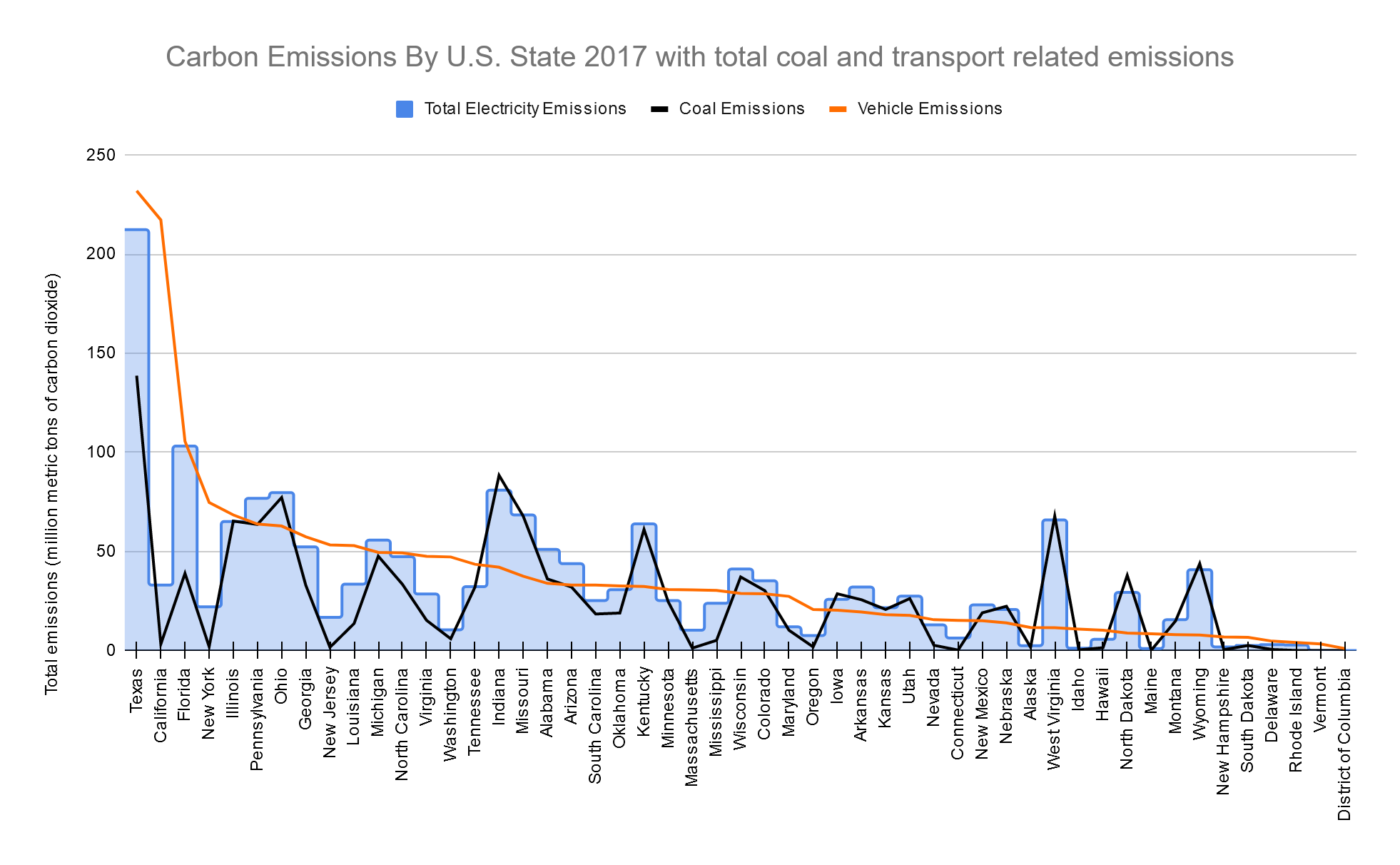
(Source:
data from US energy data information administration)
Texas and California make an excellent
point of comparison. Both states have the largest transportation related
emissions in the United States. This means that both states have the
potential to significantly reduce carbon emissions from vehicles by cutting
transportation emissions with a switch to electric vehicles. The problem is
the energy sources.
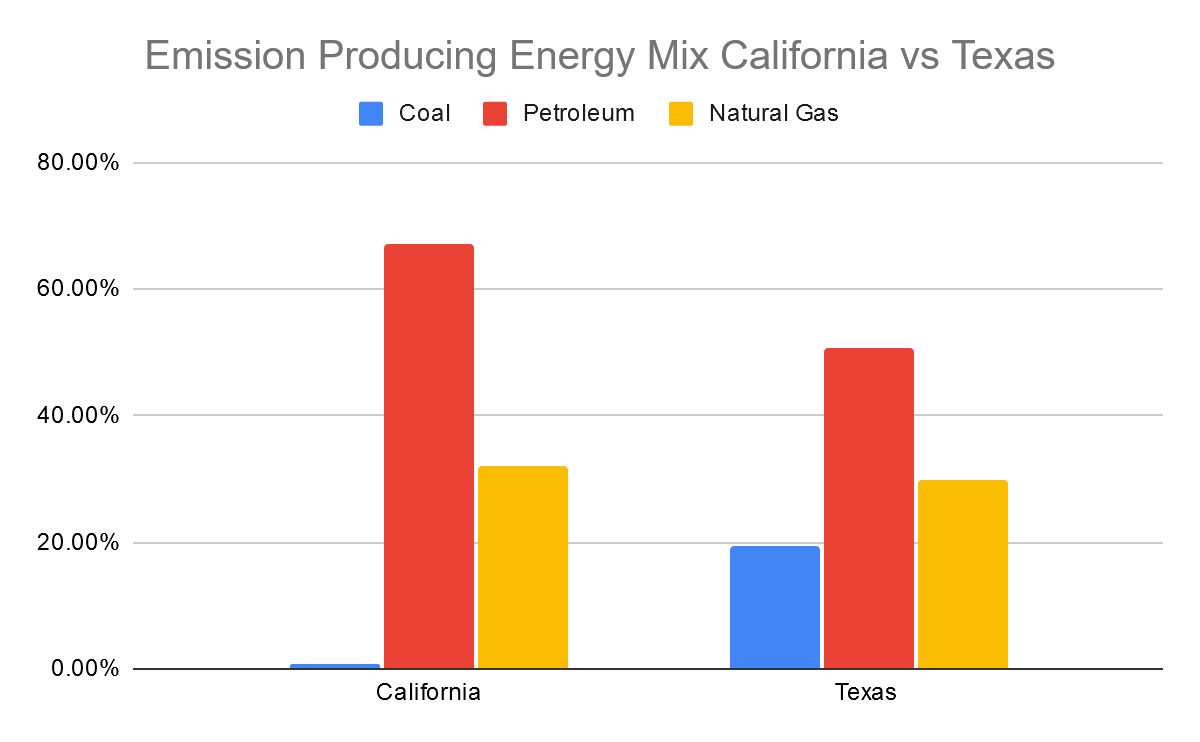
(Source:
data from US energy data information administration)
Texas relies heavily upon coal, the
most polluting source of energy, for its energy production. In comparison,
California uses virtually no coal for its energy grid.
What this means is that if California
were to make a switch to electric vehicles, it would eliminate
over 200 million metric
tons of emissions every year, with minimal increases due to fossil fuel
usage. Texas on the other hand would not help the environment much (if at
all) if they don’t first retool their energy production to be more green,
meaning that switching to an EV in Texas might not be so productive.
Despite Concerns in the Vast
Majority of Cases Electric Vehicles Will Still Reduce Energy Use
Unless you live in a country or area
which is heavily reliant upon coal energy production, like Wyoming or
Poland, it is almost certain that using an electric vehicle will have a
lower carbon impact than a traditional combustion engine vehicle. Before you
make the switch, you should take some time to research your local area, and
understand the overall impact you will have.
In the long term, it will also be
important to reduce the carbon emissions caused by energy production
generally. Wherever you live, you should vote for the construction of
renewable energy. This will mean that over its lifetime, your electric
vehicle purchases will have a much stronger positive impact on the world
around it.
